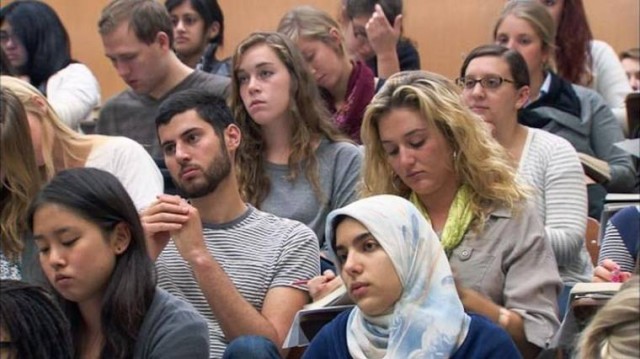 From At BerkeleyWiseman provides a reassuring picture of today's UC Berkeley
From At BerkeleyWiseman provides a reassuring picture of today's UC BerkeleyThe seemingly indefatigable American independent documentary filmmaker Frederick Wiseman, still productive at 83, has made a four-hour study of the University of California at Berkeley, so famous for its Free Speech Movement and its role in the anti-Vietnam War movement in the Sixties and early Seventies, as it is today. The theme that emerges is of a struggle, apparently so far successful, to remain a world-class place of learning in the face of post Great Recession budgetary restraints, cutting corners while trying to maintain the quality of teaching and research. There's no big news here. But Wiseman, editing down over 128 hours of digital footage, provides one of his best recent portraits of an institution, shifting around from classroom teaching to meetings of various administrators, in which the Canadian-born Robert J. Birgeneau, 2004-2013 chancellor and a renowned MIT physicist, features prominently.
Nothing is happening. And then something quietly is. A student protest, mainly calling for a return to free tuition, begins with resounding speeches on the Sproul Hall steps that invoke Mario Savio of the FSM and moves on to an occupation of the Dow Library reading room. This is an event that earlier we see being in general terms planned for at a discussion of campus cops and administrators. In the event, it disperses quietly, only to be quietly mocked later by Birgerneau at yet another administrative meeting for its lack of a forceful, specific goal -- the usual criticism of the Occupy movement.
Tellingly, perhaps (and one can always argue that Wiseman's "fly on the wall" coolness is undercut by his pointed, sometimes metaphorical, editing) there's a class in which the lively Chancellor's Professor of Public Policy and former Secretary of Labor Robert Reich talks to a mini-arena about the difficulty administrators or leaders have in "self-evaluation" since they can't get constructive criticism from their staffs even when they want it. Threaded through are sequences in classrooms. In one students discuss the growing economic squeeze on the middle class and its effect on students at UC Berkeley. At another meeting, not a class, scholarship students feeling the pinch are counseled to suck it up. There are also professors analyzing
Walden and a poem by Donne, or talking about neuro-science, physics, or paleontology. In between are cool wide-angle shots of the university's buildings, in a bland style that seems to combine Spanish mission with Stalinist. An occasional shot shows a chorus of busty sorority girls singing out of doors, a skateboard or two zipping by, students studying on the lawn or crowding through the plaza.
Wiseman seems to have had remarkable access, to all academic meetings except those on tenure, and to a variety of classes. We don't see anything lively, exciting, or brilliant happening in a classroom. Nor do we enter a dorm or see students working out at the gym, sitting in a dining hall, hanging out, or drinking beer. A decision was made to exclude footage of the city of Berkeley. The filmmaker gives us some kind of Platonic ideal of a serious, academically superior American university (Berkeley being traditionally the most elite of the many UC campuses for undergraduates, the most richly supplied with Nobel Prize winners). The result is reassuring but also a little numbing.
Happily, perhaps, this is all in sharp contrast to the lengthy 1994 PBS Frontline documentary "School Colors," which depicted the volatile mix of violence, racial conflict, idealism and talent then prevailing at Berkeley High School. That documentary, based on a year of shooting, showed the ideal of school integration failing. In contrast black students at UC Berkeley in Wiseman's film, gathered with Asian and white students to discuss issues of race and education, express satisfaction that at the university they're no longer stared at when they speak in class or stereotyped as unintelligent as they were in high school. In a way the lack of drama at Wiseman's Berkeley is reassuring. But the financial crunch remains a threat to the school's excellence. How long can a great public university keep raising student fees and still call itself public?
At Berkeley, 244 mins., debuted at Venice, was shown at Toronto, and was screened for this review as part of the 2013 New York Film Festival. It reportedly will later have a theatrical run in NYC at IFC Center and Lincoln Center. For the wider public it airs on PBS starting Monday, January 13, 2014.





